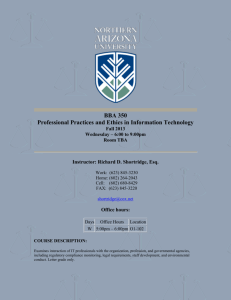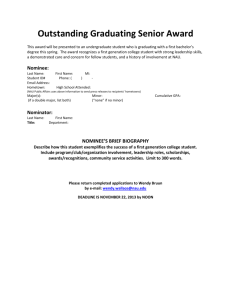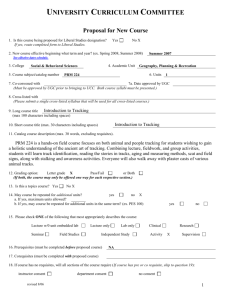ADM 660 Business Law Administration - UGC
advertisement
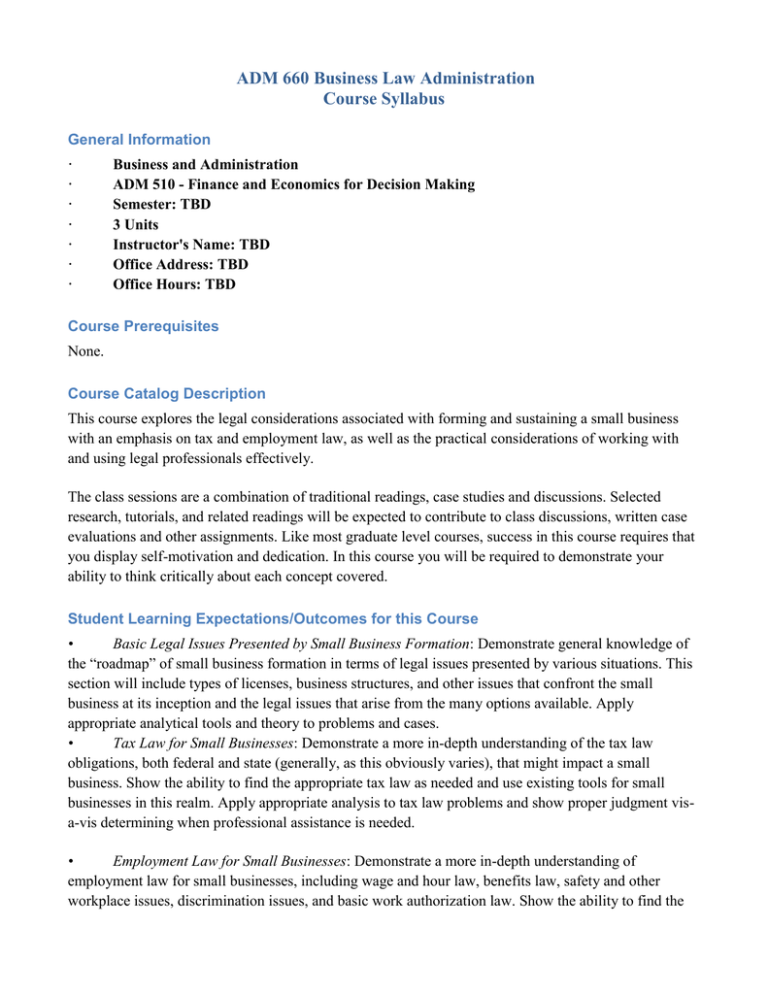
ADM 660 Business Law Administration Course Syllabus General Information · · · · · · · Business and Administration ADM 510 - Finance and Economics for Decision Making Semester: TBD 3 Units Instructor's Name: TBD Office Address: TBD Office Hours: TBD Course Prerequisites None. Course Catalog Description This course explores the legal considerations associated with forming and sustaining a small business with an emphasis on tax and employment law, as well as the practical considerations of working with and using legal professionals effectively. The class sessions are a combination of traditional readings, case studies and discussions. Selected research, tutorials, and related readings will be expected to contribute to class discussions, written case evaluations and other assignments. Like most graduate level courses, success in this course requires that you display self-motivation and dedication. In this course you will be required to demonstrate your ability to think critically about each concept covered. Student Learning Expectations/Outcomes for this Course • Basic Legal Issues Presented by Small Business Formation: Demonstrate general knowledge of the “roadmap” of small business formation in terms of legal issues presented by various situations. This section will include types of licenses, business structures, and other issues that confront the small business at its inception and the legal issues that arise from the many options available. Apply appropriate analytical tools and theory to problems and cases. • Tax Law for Small Businesses: Demonstrate a more in-depth understanding of the tax law obligations, both federal and state (generally, as this obviously varies), that might impact a small business. Show the ability to find the appropriate tax law as needed and use existing tools for small businesses in this realm. Apply appropriate analysis to tax law problems and show proper judgment visa-vis determining when professional assistance is needed. • Employment Law for Small Businesses: Demonstrate a more in-depth understanding of employment law for small businesses, including wage and hour law, benefits law, safety and other workplace issues, discrimination issues, and basic work authorization law. Show the ability to find the appropriate employment law as needed and use existing tools for small businesses in this realm. Apply appropriate analysis to employment law problems and show proper judgment vis-a-vis determining when professional assistance is needed. • Basic Documents: Demonstrate the ability to communicate effectively and specifically demonstrate an ability to understand basic legal documents including employment contracts, nondisclosure agreements, and other documents which will become everyday business. • Working Effectively with Legal Professionals: Demonstrate the ability to work effectively with legal professionals; specifically, show an ability to communicate despite the presence of “legalese,” to simplify any of your own business jargon creatively and effectively, to meet deadlines, and to operate interdependently with legal professionals using appropriate assertiveness. Show basic understanding of legal culture. Emphasis Outcomes 1) Communicate business information in a professional manner. 2) Analyze the small business environment using a variety of business tools and produce ethical actionable strategies to effectively negotiate and profit in that environment. 3) Demonstrate the ability to design, write, and produce a business plan meeting professional standards for finance, marketing, economics, business law and management in organizations. Program Outcomes 1) Demonstrate in writing knowledge of administration, leadership, organizational theory, ethics and effective management of diverse cultures in organizations. They will specifically demonstrate the ability to design, write and produce documents meeting professional standards in these key areas. 2) Demonstrate the ability to conduct both research and program evaluation that meets rigorous methodological standards and produces useful, actionable, results. 3) Analyze problems and create solutions using a variety of qualitative and quantitative problemsolving processes, technologies, systems approaches, and innovative/creative thinking. 4) Demonstrate professional skills applied to practical problems by consistently meeting deadlines, working both independently and collaboratively in teams, and integrating scholarly knowledge from the student's chosen field of specialization and the Core area. 5) Demonstrate a commitment to lifelong learning and develop the skill sets necessary to pursue and find the answers to professional questions through detailed study in and contribution to the scholarly literature of the student's chosen field. Course Structure This course uses an ONLINE delivery methodology. Course format and scheduling will follow a sevenweek timeline delivery system. Class meetings occur ONLINE for all weeks. Textbook and Required Materials Legal Guide for Starting & Running a Small Business Fred S. Steingold, Attorney April 2013, 13th Edition The Entrepreneurs Guide to Business Law Constance Bagley &Craig E. Dauchy Cengage 4th ed. 2012. ISBN # 10: 0-538-46646-4 All other required readings are within course shell. Assessment of Student Learning Outcomes 1) Methods of Assessment a) Full and partial project deliverables, b) Discussions, 2) Timeline for Assessment a) Referenced online discussions for topics and sub-topics, b) Project/assignment deliverables, Participation/Discussions Everyone must participate in discussions in class. This is absolutely paramount and should be your top priority. Each week you should strive to bring something interesting to talk about to the table, and since you have chosen this field at the graduate level as your area of study and invested so much time, money and effort into it, I am guessing you will be able to naturally come across small business law discussion topics without even trying. Good. Bring them into your virtual classroom, please. Participation is worth 16 points overall, or 16% of your grade. So, each week when you participate you'll earn 2 points if you complete your post and responses EXCEPT for Week One wherein there is an “Introduction” thread AND a normal “Week One Discussion” thread. So in Week One you have to do TWO original posts and FOUR replies, two for each thread. You will get four points for the two posts. Weekly Question Answered – Journal Space You'll keep a brief, no-format “journal” in this course. You are responsible for one or more entries each week. You will see where to post them in the course and in that section only you and I can see what you post. Your journal's sole purpose is to answer a question posed by the issues of the week as they would pertain to your own small business. For example, if one thing we cover is what type of business structures are out there, figure out what structure would be best for your small business and why. What matters here is that you've explored the topic and tried to answer it for your own business scenario. If you have no small business in mind, make one up. Your journal is also worth two points each week, for a total of seven weeks and 14 points. So journals in the end are worth 14% of your grade. Case Study Assignment In this course we will review a number of case studies. You can choose any of these for this assignment. You may also bring in one of your own, but you must receive prior approval to do so. For this assignment you are applying your own critique and ideas based on what we have covered so far in the course. This case study should be roughly between two and five pages. The assignment is worth up to 15 points of your grade. This assignment is due the end of Week Four. Small Business Law Article Review This assignment will expose you to current and/or classic academic literature on small business law. This week you will simply choose whatever peer-reviewed, research-based article you find to be interesting, read it as your assignment, and post to the board as if you are leading a brief discussion on it. So, your assignment is to find an appropriate article that is within the scope of this course and cover it. Read the article and prepare to give a brief discussion of the material which should give 1) an overall summary and then answer the following questions: 2) What is the purpose of this article? 3) What was interesting about this article? 4) What relevance does it have within the realm of small business law? At that point you’ll field questions and hopefully lead a brief discussion based on your thought-provoking analysis of your article. This assignment is worth 25% of your grade and is due the end of Week Five. You must submit your article by Sunday of Week Three for approval. Final Project By the close of this course, if all goes to plan, you will have a journal that answers some of your legal questions for your small business plan, an article review, and a case study, all of which showcase your extensive knowledge of the law as it impacts small businesses. Naturally, you should be well-prepared at this point for your final project. For your final project you will create a case study of your own small business or a small business that you do business with (for example a vendor) utilizing what you have learned in the course. This is due Sunday of Week Seven and counts for 30% of your grade. Your grade will be based on the overall quality and thoroughness of your project. Course Outline Week 1 Course Introduction, general “roadmap” of small business formation in terms of legal issues presented by various situations. This section will include types of business structures, naming your business, and other issues that confront the small business at its inception and the legal issues that arise from the many options available. Required Reading: Syllabus Legal Issues to Consider When Starting Your Business: Bagley Chapters 1-2 Your Business Structure: Steingold Chapters 1-5, Bagley Chapter 5 Assignments: Discussions, both the “Introduction” and “Week One Discussion” threads Journal Week 2 More Course Introduction, general “roadmap” of small business formation in terms of legal issues presented by various situations. This section will include types of business licenses, naming your business, nondisclosure agreements and other beginning contracts, zoning problems, and other issues that confront the small business at its inception and the legal issues that arise from the many options available. Required Reading: What's In a Name? Steingold: Chapter 6 Business Licenses: Steingold: Chapter 7 Nondisclosure Agreements, Leases, and other Contracts: Bagley: Chapter 9, Steingold: Chapter 13 Zoning: Steingold: Chapter 14 Case Study: Help for a Start Up: But At a High Price Assignments: Discussion Journal Week 3 Tax law obligations, both federal and state (generally, as this obviously varies), that might impact a small business. Learn to find the appropriate tax law as needed and use existing tools for small businesses in this realm. Analyze tax law problems and show proper judgment vis-a-vis determining when professional assistance is needed. Required Reading: Steingold: Chapter 8 We will also be working from the SBA website, so look around: http://www.sba.gov/content/business-structure-and-tax-implications http://www.sba.gov/content/learn-about-your-state-and-local-tax-obligations http://www.sba.gov/community/discuss-popular-topics/filing-and-paying-taxes http://www.sba.gov/content/collecting-sales-tax-over-internet Case study: Connect and Develop: Inside Procter & Gamble’s New Model for Innovation Assignments: Discussion Journal Final Project Proposal Due Week 4 Employment law for small businesses, including wage and hour law, benefits law, safety and other workplace issues, discrimination issues, and basic work authorization law. We will find the appropriate employment law as needed, use existing tools for small businesses in this realm, apply appropriate analysis to employment law problems, and show proper judgment vis-a-vis determining when professional assistance is needed. Required Reading: Steingold: Chapter 15 Bagley: Chapter 8 We will be all over the DOL website, get busy: http://www.dol.gov/compliance/guide/ Basic FLSA like minimum wage: http://www.dol.gov/compliance/guide/minwage.htm OSHA: http://www.dol.gov/compliance/guide/osha.htm ERISA (employee benefits): http://www.dol.gov/compliance/guide/erisa.htm FMLA: http://www.dol.gov/compliance/guide/fmla.htm Disability issues: http://www.dol.gov/compliance/guide/503.htm Blue Ocean Case Studies and How to Apply Them to Your Writing Evaluating New Venture Opportunities: Conversations with Venture Capitalists Assignments: Discussion Journal Case Study Due Week 5 Basic Documents: learning to communicate effectively and specifically demonstrate an ability to understand basic legal documents including employment contracts, non-disclosure agreements, and other documents which will become everyday business. Required Reading: Steingold: Chapter 20 Bagley: Chapter 9, 14 Struggling to Recover from a Cyberattack 10 Simple Writing Tips for Non-Lawyers Assignments: Discussion Journal Small Business Law Article Review Due Week 6 Working Effectively with Legal Professionals and Basics of IP: This week we focus on the ability to work effectively with legal professionals. Specifically, the ability to communicate despite the presence of “legalese,” to simplify any of your own business jargon creatively and effectively, to meet deadlines, and to operate interdependently with legal professionals using appropriate assertiveness. Students will also learn a basic understanding of legal culture as well as basics of intellectual property. Required Reading: Steingold: Chapters 22, 23, 24 Bagley: Chapter 3, 14 http://www.forbes.com/sites/danielfisher/2011/07/25/non-lawyers-find-it-hard-avoid-breaking-barsvague-rules/ The Ten Commandments of How to Work Effectively With Lawyers Assignments: Discussion Journal Week 7 Required Reading: No new reading Assignments: Discussion Journal Final Project Due Grading System Discussion Weekly Question Answered/Journal Case Study Assignment Article Review Final Project TOTAL 16 points 14 points 15 points 25 points 30 points 100 points ~35% Discussions ~15% Mini-papers ~40% Project/assignment deliverables ~10% Final ~10% Participation Note: These percentages are a guideline and may vary plus or minus 10% at the instructor’s discretion and with the understanding that some assessment items may be combined. Grades will be assigned on the basis of total points earned relative to the following scale: >= 90% A 80% ~ 89% B 70% ~ 79% C 60% ~ 69% D < 60% F Course Policies Learners are expected to participate on at least 3 days out of each 7-day week of ONLINE meetings. Participation is expected in several discussions relating to the subject matter for the week. Discussions will take place in the BBL discussion area as assigned by the course instructor. Learners will read, analyze, and respond to questions and comments from the faculty member and fellow learners. Participation in the ONLINE segments of this course require substantive contributions, typical of graduate level critical thinking and analysis, well cited, and presented free of errors in grammar, punctuation, sentence structure, and so on. A "substantive contribution" contains at least 100 words based on the original thoughts of the author. Stand-alone comments such as "I agree" do not constitute substantive contributions. Failure to substantively participate online will lead to reduction of participation points. Inappropriate comments using abusive, racial or demeaning language are strictly prohibited and will lead to a remedial conversation with the course faculty member, and possible dismissal from class. A Note on Course Requirements • Weekly attendance is mandatory. Please notify instructor of any major emergency that will keep you from taking part in class activities. • Assignments submitted for another class may not be used for this class. • All assignments must be the original work of the student or properly referenced. • Papers should be submitted in an appropriate style and format as established by the university. • All assignments must be posted by the due dates specified in the Class Calendar. NAU Policy Statements SAFE ENVIRONMENT POLICY NAU’s Safe Working and Learning Environment Policy seeks to prohibit discrimination and pro mote the safety of all individuals within the university. The goal of this policy is to prevent the occurrence of discrimination on the basis of s ex, race, color, age, national origin, religion, sexual orientation, disability, or veteran status and to prevent sexual harassment, sexual assault or retaliation by anyone at this university. You may obtain a copy of this policy from the college dean’s office or from the NAU’s Affirmative Action website http://www4.nau.edu/diversity/swale.asp. If you have concerns about this policy, it is important t hat you contact the departmental chair, dean’s office, the Office of Student Life (928‐ 523‐ 5181), or NAU’s Office of Affirmative Action (928‐ 523‐ 3312). STUDENTS WITH DISABILITIES If you have a documented disability, you can arrange for accommodations by contacting the office of Disability Support Services (DSS) at 928‐ 523‐ 8773 (voice), 928‐ 523‐ 6906 (TTY). In order for your individual needs to be met, you are required to provide DSS with disability related documentation and are encouraged to provide it at least eight weeks prior to the time you wish to receive accommodations. You must register with DSS each semester you are enrolled at NAU and wish to use accommodations. Faculty are not authorized to provide a student with disability related accommodations without prior approval from DSS. Students who have registered with DSS are encouraged to notify their instructors a minimum of two weeks in advance to ensure accommodations. Otherwise, the provision of accommodations may be delayed. Concerns or questions regarding disability related accommodations can be brought to the attention of DSS or the Affirmative Action Office. For more information, visit the DSS website at http://www2.nau.edu/dss/. INSTITUTIONAL REVIEW BOARD Any study involving observation of or interaction with human subjects that originates at NAU— including a course project, report, or research paper—must be reviewed and approved by the Institutional Review Board (IRB) for the protection of human subjects in research and research‐ related activities. The IRB meets monthly. Proposals must be submitted for review at least fifteen working days be fore the monthly meeting. You should consult with your course instructor early in the course to ascertain if your project needs to be reviewed by the IRB and/or to secure information or appropriate forms and procedures for the IRB review. Your instructor and department chair or college dean must sign the application for approval by the IRB. The IRB categorizes projects into three levels depending on the nature of the project: exempt from further review, expedited review, or full board review. If the IRB certifies that a project is exempt from further review, you need not resubmit the project for continuing IRB review as long as there are no modifications in the exempted procedures. A copy of the IRB Policy and Procedures Manual is available in each department’s administrative office and each college dean’s office or on their website: http://www4.nau.edu/ovp/regulatorycompliance/irb/index.htm. If you have questions, contact Melanie Birck, Office of Grant and Contract Services, at 928‐ 523‐ 8288. ACADEMIC INTEGRITY The university takes an extremely serious view of violations of academic integrity. As members of the academic community, NAU’s administration, faculty, staff and students are dedicated to promoting an atmosphere of honesty and are committed to maintaining the academic integrity essential to the education process. Inherent in this commitment is the belief that academic dishonesty in all forms violates the basic principles of integrity and impedes learning. Students are therefore responsible for conducting themselves in an academically honest manner. Individual students and faculty members are responsible for identifying instances of academic dishonesty. Faculty members then recommend penalties to the department chair or college dean in keeping with the severity of the violation. The complete policy on academic integrity is in Appendix G of NAU’s Student Handbook http://www4.nau.edu/stulife/handbookdishonesty.htm. ACADEMIC CONTACT HOUR POLICY The Arizona Board of Regents Academic Contact Hour Policy (ABOR Handbook, 2 ‐ 206, Academic Credit) states: “an hour of work is the equivalent of 50 minutes of class time...at least 15 contact hours of recitation, lecture, discussion , testing or evaluation, seminar, or colloquium as well as a minimum of 30 hours of student homework is required for each unit of credit.” The reasonable interpretation of this policy is that for every credit hour, a student should expect, on average, to do a mini mum of two additional hours of work per week; e.g., preparation, homework, studying.
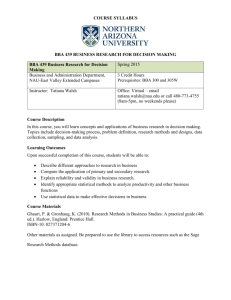
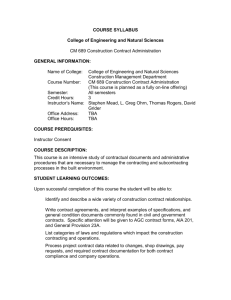

![Syllabus [Word]](http://s3.studylib.net/store/data/006967311_1-8dc868a12812e520f131dbbe02cc269a-300x300.png)

